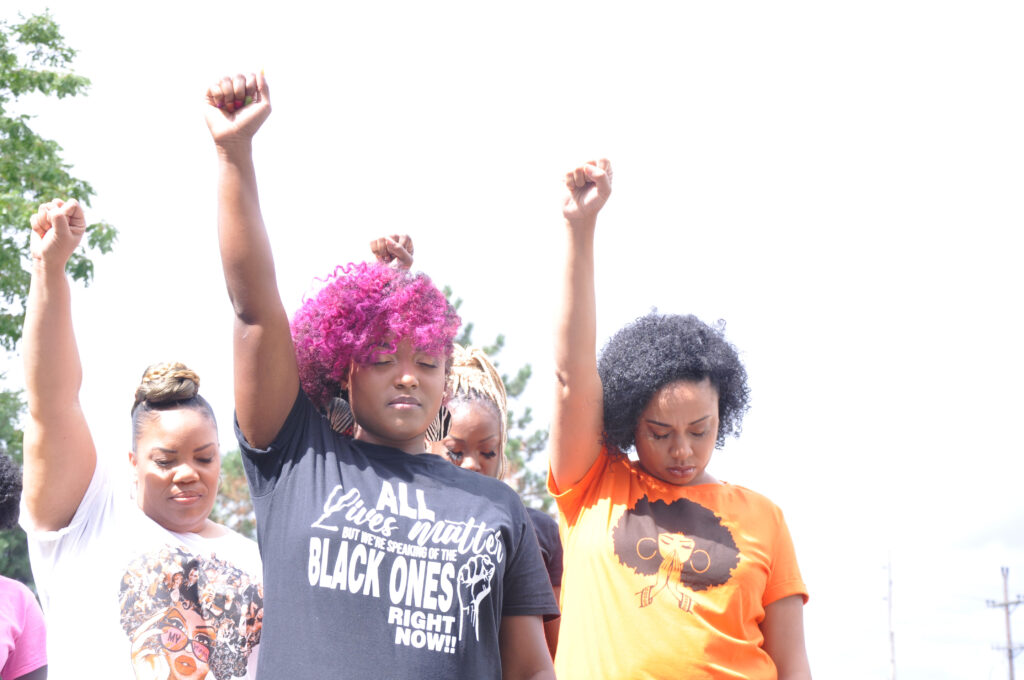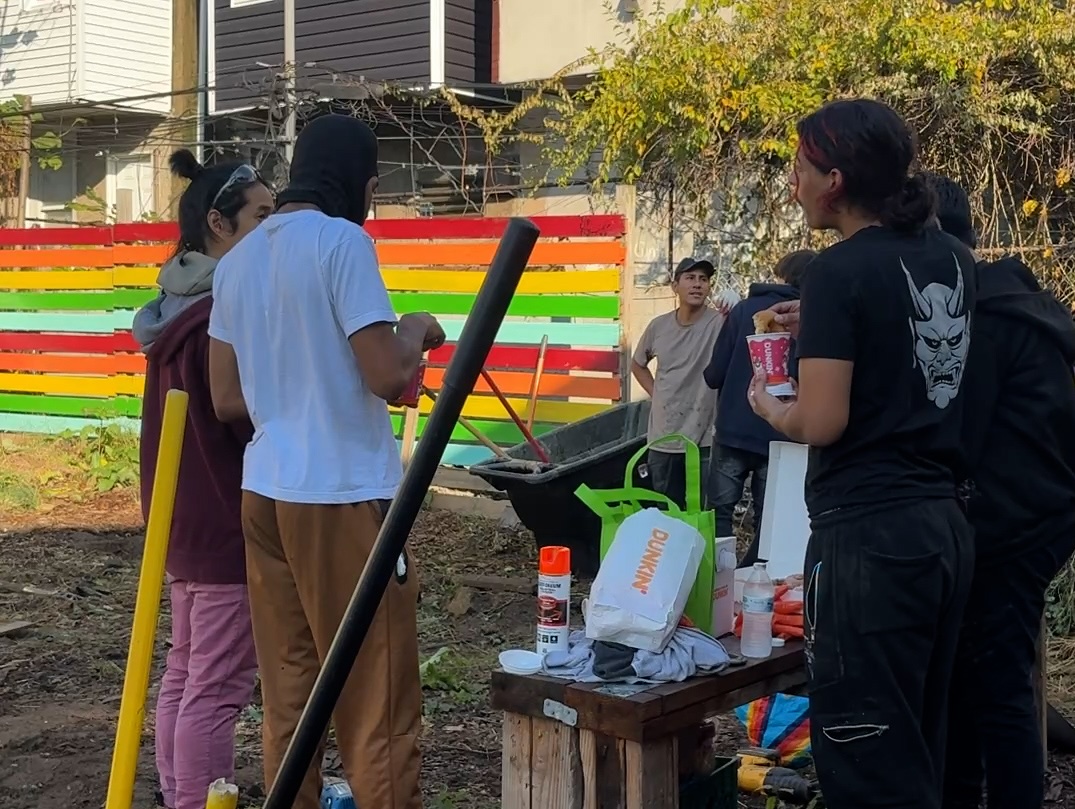( NEW JERSEY ) — “I was really unpacking why I felt so disturbed by this particular election outcome,” said social media content creator Jodie Ktay the morning after Election Day. “And the reality is…the story of Kamala Harris feels like the story of myself. It feels like the story of so many Black women I know who are talented, qualified, capable, who are brilliant, who have to be all of these things. There’s no room for failure. There’s no room for slip-ups. There is always an and yet, and yet, you get passed up for that promotion. You don’t get the job, you don’t, you don’t, you don’t, and it reminds you of the inadequacies and the failures, not of you, but of the system that you exist in.”
From Black women on TikTok eagerly finding the secret to Vice President Kamala Harris’s silk press hairstyle, to Black students inspired by seeing someone who looked like them potentially holding the highest office in the United States, many were confident she would become the first Black and South Asian woman president. But the morning after Election Day, those same people who galvanized on social media were filled with heavy hearts, because America was not ready for Harris — or someone who looked like her.
While devastating for so many, President-elect Donald Trump’s win didn’t discourage the Black women who gathered on Dec. 3 for an event hosted by the African American Policy Forum (AAPF). The panel, “Views From the 92%: Black Women Reflect on the 2024 Election and the Road Ahead,” of Black women analysts, civil rights advocates, scholars, and journalists discussed how the 92% of Black women who voted for Harris can move forward.
The virtual panel emphasized that while grieving is important, it’s just one step in the process. Demanding media accountability, amplifying Black voices, and investing in Black institutions, they urged those who are grieving to turn the pain into action.
The panelists made clear that Harris’s loss was a pivotal moment for Black women to reconceptualize their collective power and redefine their role in shaping America’s future. For Black women, this isn’t just a moment for reflection — it’s a call to action.
Building on the need to develop independent structures and amplify Black voices, one of the panelists, Barbara Arnwine, president and founder of the Transformative Justice Coalition, called on Black women to persist in the next four years.
“Hold tight to our fight,” Arnwine said. “Don’t ever go backward. We only know forwards.”
How Black women in media can respond
The panelists stressed the critical role of Black women in media to combat systemic biases and reshape narratives, particularly in light of the mainstream media’s treatment of Harris during the 2024 presidential election cycle.
Calling out what they see as mainstream media’s failure to adequately cover misogynoir and stereotypes in post-election coverage, they argue it’s necessary to understand, in order to stay proactive. This double standard in media benefited Trump from “preferential treatment” while Harris faced persistent “negative coverage,” said Kimberlé Crenshaw, the Isidor and Seville Sulzbacher Professor of Law at Columbia University, the night of the panel.
“Racism and sexism ain’t my birthright,” said Latasha Brown, co-founder of the Black Voters Matter Fund at the panel.
While some outlets analyze racial or gender voting patterns, Crenshaw says they often “fail to interrogate the reasons behind it,” neglecting topics like misogynoir and entrenched stereotypes. She adds these exclusions have profound ramifications. The role of Black media — and particularly Black women in media — is significantly crucial for the purpose of defending Black women from misogynoir post-election, the Black women concluded.
“Racism is one of the oldest forms of misinformation and disinformation,” said Karen Attiah Washington Post columnist and panelist during the discussion. She encouraged her media colleagues to “present their information in a different way,” particularly to counter the influence of disinformation on social media.
A message to Black women right now: everything you’re feeling is justified. don’t let anyone gaslight you in the coming days. Take time to feel and process your emotions. And after all that, take time to rest — first for however long you need, then however long you want.
— cheyanne m daniels (your alien superstar) (@CheyannaMarie97) November 6, 2024
“We have a responsibility not to allow white supremacy to shape the stories we tell,” said Kirsten West Savali, vice president of content at iOne Digital at the panel. “We understand that we do ourselves a disservice when we take the framing that mainstream media gives us and respond to it.”
This concern was evident in the 2024 election cycle, where headlines often minimized Vice President Kamala Harris’s leadership by framing her campaign through the lens of racial and gender stereotypes, rather than her qualifications or policy platform, according to media columnist Margaret Sullivan of The Guardian.
Drawing inspiration from the famous 20th century journalist and civil rights activist Ida B. Wells, Savali called for “creating stories rooted in nuance and truth.”
Black media needs to stay committed to breaking free from “party politics,” and instead amplify the “lived experiences” of Black people, creating spaces for the community to strategize and work toward solutions independently before seeking external engagement, Savali said.
Adapting to digital adversity
Social media companies support the idea that platforms aim to attract users, prioritize user engagement to collect data, and sell ads over addressing mental health or equitable change for Black women, Meredith Clark, an associate professor of race and political communication at the University of North Carolina, told The Click. However, Black women excel at adjusting to what is given and transforming it into something their own, a strength that is particularly evident on social media and, as Clark argues, will be crucial in the presidential years ahead.
“Connection and doing what we have continued to do over time, which is customized and update and adjust,” said Clark when talking about better ways for Black women to invest their time and resources, to wit, “to shape these technologies and our use of these technologies in ways that serve us, even when that was not their intention.”
From advancing the Black Lives Matter movement to generating a sense of belonging, social media has been a pivotal tool for the Black community. However, as highlighted in the docuseries featuring Clark, “Black Twitter: A People’s Story,” there has been a pattern of Black women being attacked on social media for expressing their political concerns
@mediabuyingbestie im actually gonna create the community right now. It will be linked in my bio by eod. #mediabuyer #mediabuying #blackgirlmagic #fyp #fyppppppppppppppppppppppp
“I would say the primary obstacle is surveillance and harassment, because, as we are using these platforms and technologies to connect…what we do, and what we create, is always being watched and extracted for purposes that we did not intend and purposes that can outright harm us,” said Clark, the author of “We Tried to Tell Y’all.”
Due to this power, Clark argues although Black women initially making connections online is powerful, for the next four years, Black women need to also “move to another space so that we can continue to foster that connection and build without exposing ourselves to greater harm.”
‘Founders of a new nation’
Political and social engagement for Black women shouldn’t just be about “participation” in existing systems, instead, we need to discern and exert “raw power,” Brown said on the AAPF panel. The 2021 Harvard America Democracy Fellow stresses that Black communities need to actively engage with and reshape the structures that make decisions about their lives.
Brown argues that Black women often serve as the source of “innovation and creativity,” but their contributions are extracted.
“This is a moment for us to really think about how we’re investing in organizations and the intellectual enterprise of Black women, instead of giving that to institutions that don’t value us, that extract our ideas, that extract our energy,” said Brown. “We’ve got to figure out how we think of ourselves not just as citizens of this nation, but how do we think of ourselves as founders and mothers of a new nation.”


